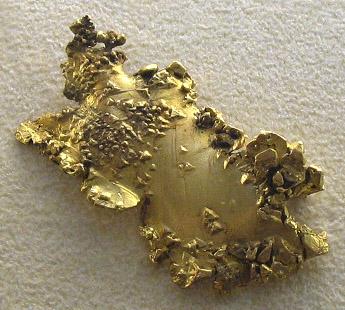Common sense teaches us that when we heat something it softens - but a team of researchers from the University of Toronto demonstrated the exact opposite.

Common sense teaches us that when we heat something it softens - but a team of researchers from the University of Toronto demonstrated the exact opposite. Their findings are published in the scientific journal Science in January.
"Although it is contrary to common sense, gold hardened instead of softening," says researcher Miller. Can you imagine a blacksmith heating gold to pound it and it turns out to him that the gold actually hardens? But we heated the gold at enormous heating rates - well over billions of millions of degrees every second - a temperature approaching that prevailing in the centers of the stars."
The gold was heated at a rate that was too fast for the electrons to absorb the excess energy and collide with neighboring atoms to lose this additional energy," he explains. "Consequently, the electrons, on average, are further away from the atomic nuclei and therefore less mask the nuclear positive charge. In fact, the bonds between the atoms become stronger."
"A gold lattice consists of gold ions and loosely bound electrons that mask the repulsive forces between these ions," explains lead author Ralph Ernstorfer. As a result, there are actually attractive forces between the ions. Unlike other materials, heating the electrons in gold using very short laser pulses strengthens the bonds between the ions, resulting in a harder lattice with a higher melting point.
The result of strengthening bonds in gold was predicted theoretically. Now, we have watched this actually happen for the first time," explains the researcher.
The researchers used a method known as "femtosecond electron diffraction" to obtain their observations. This method can be described as a kind of camera for receiving "videos" at the atomic level. By projecting pulses of electrons, at a rate of femtoseconds, through the thin gold lattice, it is possible to record the atomic movements of the ions in real time while heating the sample with a laser. By measuring the heating rate, the rate of atomic movements and the final melting point of the crystal, it is possible to conclude what the change in lattice stability is as a result of the laser activation.
"We now have an observation at the atomic level of this rare state, of heated compressed matter, and we are able to attribute the observed liquid structure to the increased stability of the lattice," says the researcher.

9 תגובות
The writing is too big and you can't understand anything!!!
I wonder if there will be several places where this feature can be used
And maybe they will discover other materials with similar properties
Society:
All this focus on the title misses the point and the point is that computational models of the material's behavior received impressive confirmation here.
Let's clap and move on.
Gold does not harden when heated, it hardens with a very specific technique, laser bombardment if you will.
When heated (in the classical sense) the gold will indeed soften.
The title should be: "A modern heating method that hardens gold".
"Point", you don't know the meaning of the word forum.
Pen, surely as a devoted reader of tabloids you have developed a special sensitivity to headlines.
Most of the readers in the forum do not usually read tabloids, so your claims are not of interest to us.
A wild hypothesis: maybe the source of the gold is fossilized protein??? I was just thinking, an egg, etc.
It is possible that the chemistry of the metals should be checked again.
Interesting article. Unlike Mr. Pen (witty) I think the title is very appropriate. It is precisely in the popular press that it is sometimes customary to be clever and give clever and meaningful or somewhat literary titles (in the style of "from the pen") but this kind of loses itself. A direct title of the subject and the final result is the most relevant. It's excellent and functional (horrifyingly). I am in favor.
I wonder what all this means. Gold has a hard time heating up... heh... mmmmhh... good. I don't understand this whole caterpillar-caterpillar thing. If scientists see fit to publish then I am younger than my son.
Greetings from amateurs,
Ami Bachar
Good article. The title is really wrong. A bit reminiscent of yellow newspapers.
Why not decorate this relevant article with a respectable and professional title?
Magnesium!